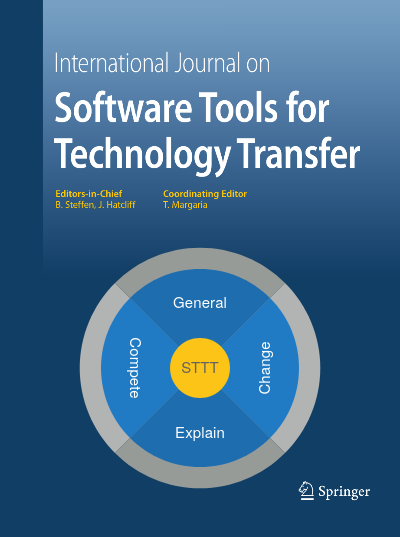STTT
International Journal on Software Tools for Technology Transfer

Thematic Themes
The new STTT structure has the following four Thematic Themes (General Papers and the three new Themes) and each with its own editorial sub-board.
General 🔗
Submissions to this area address the broad themes of rigorously developed tools and their application with particular focus on the following three major technical themes:
- Construction and analysis issues: This involves hierarchical and compositional approaches; syntax-oriented vs. semantic methods; synthesis vs. verification; formal support of the entire system life cycle, including requirements capture, design, implementation, verification, testing maintenance, evolution; analysis of non-functional aspects of system behavior, such as real-time, probability, and efficiency.
- Practicality issues: This addresses performance, genericity, and usability of tools; case studies and experience reports; industrial use and feedback.
- Generic tool issues: Those include paradigms (fully automated vs. interactive approaches); design issues (modularity, efficiency, portability, integrability, reusability); automatic support (tool generators, integrators, and interface builders); user interfaces (graphics, Web forms, retrieval).
Authors should check whether their papers fit the stronger focus of one of the following three Thematic Themes.
Competitions and Challenges (CoCha) 🔗
Progress and technology transfer in the formal methods community has been facilitated by competitions and challenge problems that focus the community on specific goals and that enable rigorous metric-based cross-comparison of tools. CoCha seeks overview articles about new competitions, progress reports of established research competitions, benchmarks and challenge problems, e.g., made precise via concrete case study scenarios, as well as articles that provide insights about research competitions as a scientific method. more…
Explanation Paradigms Leveraging Analytic Intuition (ExPLAIn) 🔗
Today’s decision-making is increasingly aided by computers, be it in medicine, in the stock market, when playing Go or Chess, or when we follow recommendations provided by various platforms. Few people question the often machine learning-based automated support and ask for explanations. But how justified is this trust? ExPLAIn aims at answering this question in a structural, algebraic way by (1) opening up the black box-character of today’s systems leveraging the wealth of formal methods that have been developed over recent decades by the formal methods community, dually, (2) exploiting experimental approaches such as those developed in the machine learning community to validate the practical impact of the conceptual approaches, and (3) revealing and characterizing conceptual hurdles and limitations, pinpointing special challenges, and proposing alternative ways for circumvention. more…
Foundations for Mastering Change (FoMaC) 🔗
Modern systems often evolve significantly and at fast speed to support new versions of programming languages, software libraries, technology refresh to underlying hardware, dynamically evolving architectures, self-adaptive systems, and updates to address security vulnerabilities. FoMaC seeks articles on modeling and designing for change, reasoning about semantics and constraints of changes, automatically determining and controlling impacts of changes, generative programming, and other techniques for engineering for adaptivity. more…
For each of these areas, the traditional concerns of STTT, including rigorous design, semantics-based reasoning, and formal methods, are emphasized.
STTT also welcomes Invited Issues – complete issues or portions of an issue that are dedicated to selected papers from an event (Special Issues) such as a conference or to a particular theme (Special Sections). Papers in Invited Issues should address the traditional concerns of STTT or one or more of the STTT Theme areas.